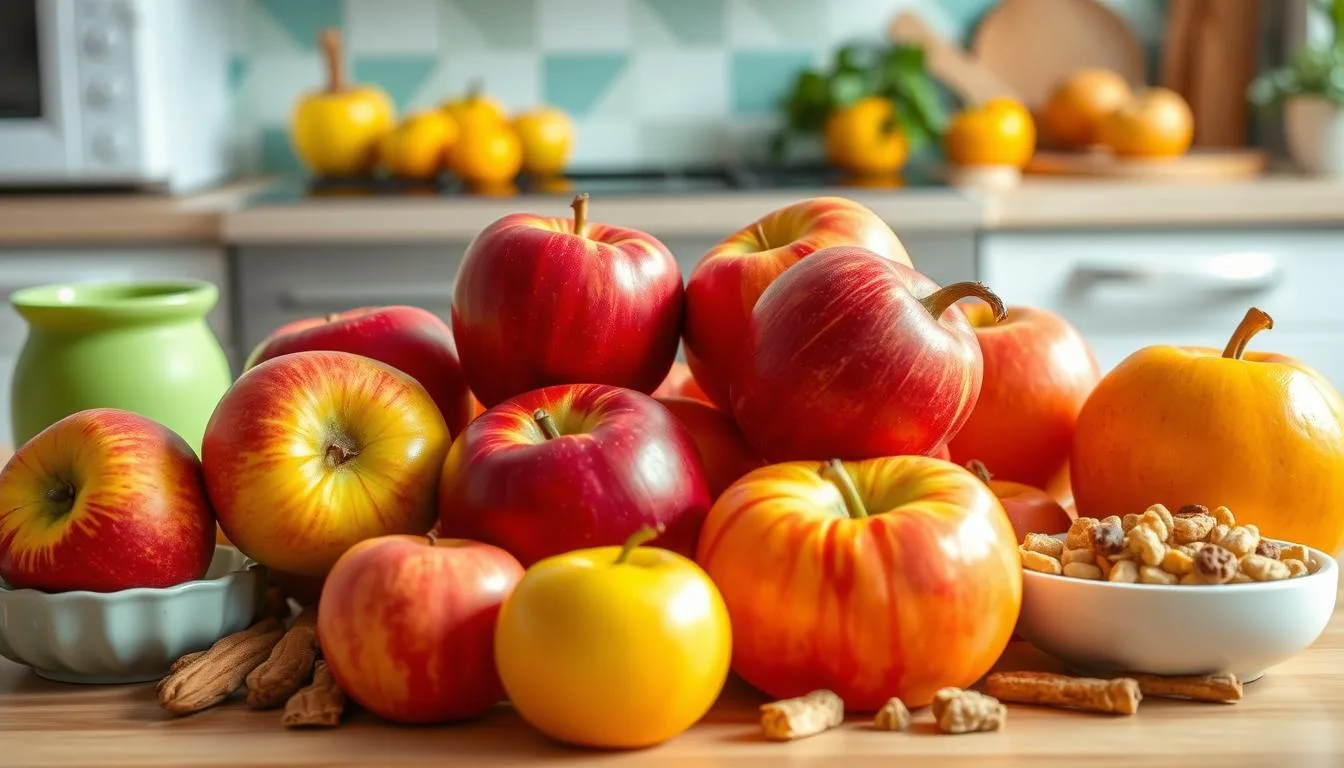Apples are a superfood that can make a big difference in your toddler’s diet. They are crunchy, sweet, and full of nutrients. With almost 8,000 types around the world, apples are a fun way to help your child stay healthy.
One apple gives your child important vitamins and minerals. The US National Health and Nutrition Examination Survey says apples are great for kids. They are full of nutrients that help your child grow strong. Learning about the benefits of apples for toddlers can show how these delicious fruits contribute to your child’s overall health and well-being.
Key Takeaways
- Apples are a low-calorie, nutrient-dense food for toddlers
- One medium apple contains approximately 100 calories
- Provides 14% daily value of vitamin C
- Contains 4 grams of dietary fiber per serving
- Supports digestive and immune system health
- Offers natural antioxidants for cellular protection
Table of Contents
Understanding the Nutritional Profile of Apples
Discovering the nutritional power of apples can change how you see this simple fruit. Apples are full of important nutrients that help your child grow and develop.
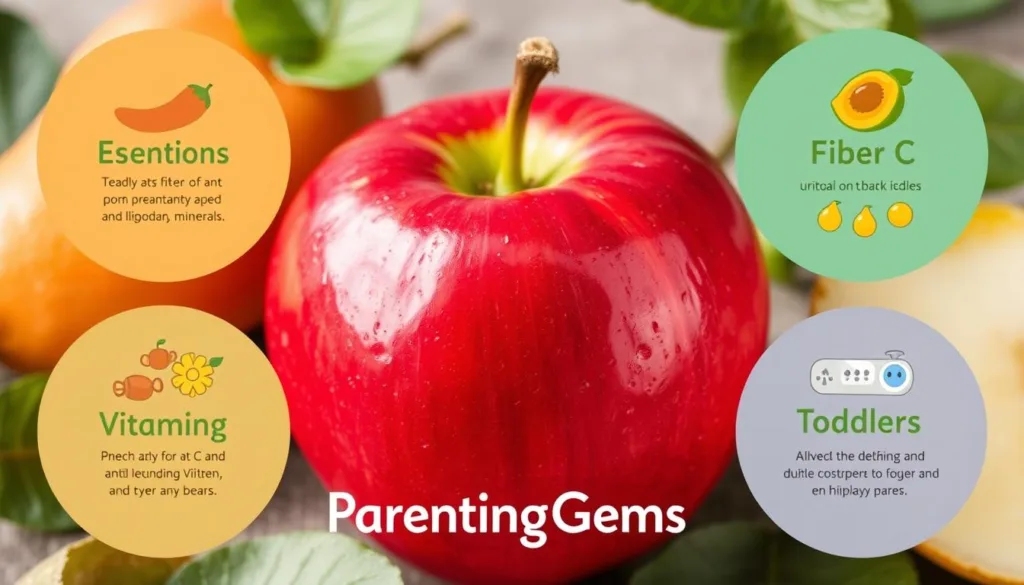
Apple nutrition is more than just a snack. A medium apple has lots of vitamins and minerals that are key for your toddler’s health.
Essential Vitamins and Minerals
Apples are full of nutrients that are good for your health. They have:
- Vitamin C for immune system support
- Potassium for heart health
- Antioxidants that protect cells
Natural Sugars and Fiber Content
The fiber in apples makes them very nutritious. One medium apple has about 3 grams of fiber. This helps with digestion and keeps blood sugar steady.
“An apple a day keeps the doctor away” – This old saying is true because of the fruit’s great nutrition.
Caloric Value for Growing Children
Are you worried about calories? A medium apple has only 95 calories. It’s a great snack for growing kids because it gives quick energy without making them gain weight.
| Nutrient | Amount per Medium Apple |
|---|---|
| Calories | 95 |
| Carbohydrates | 25g |
| Dietary Fiber | 3g |
| Vitamin C | 14% Daily Value |
Pro tip: Choose organic apples when possible to minimize pesticide exposure while maximizing nutritional benefits.
Benefits of Apples for Toddlers
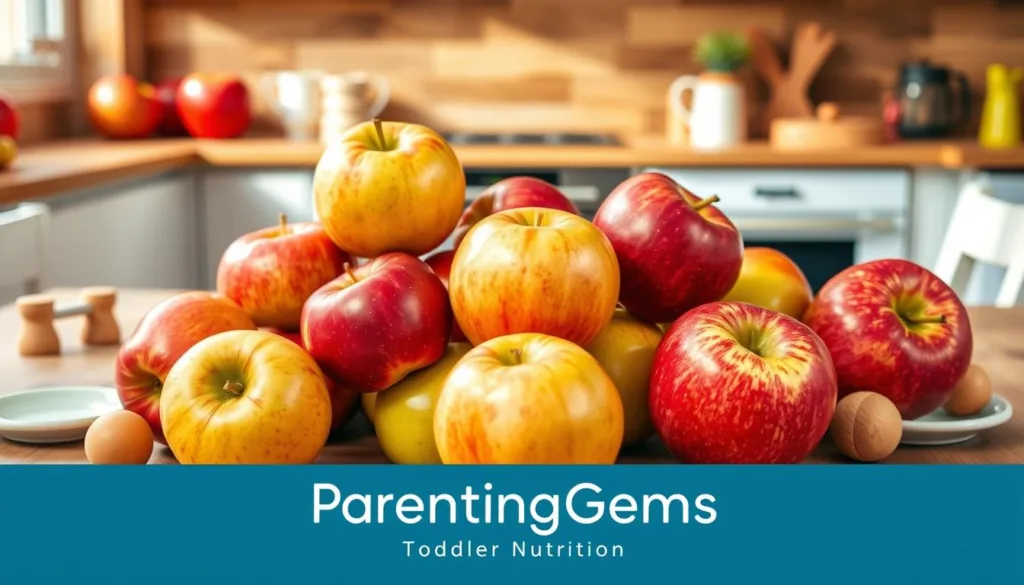
Apples are full of nutrients that help toddlers grow strong. They are a tasty way to keep your child healthy and happy.
Apples do more than just satisfy hunger. They are packed with benefits for kids. Here’s why apples are great for your child’s diet:
- Energy Boost: Natural sugars give quick and lasting energy
- Heart Health: Helps lower bad cholesterol
- Digestive Support: Pectin fiber keeps the gut healthy
- Immune System Enhancement: Rich in antioxidants
Apples are a top choice for kids’ health. One apple has only 95 calories and lots of important nutrients. They have fiber, vitamins, and minerals that help your child grow.
“An apple a day keeps the doctor away” isn’t just an old saying – it’s nutritional wisdom for growing children!
Apples have antioxidants like quercetin in their skin. These protect the body and brain. They might even help your child’s brain grow stronger.
Adding apples to your child’s meals is a smart move. They are full of good stuff and help kids eat well.
Supporting Digestive Health in Young Children
Digestive health is key for your toddler’s well-being. Apples are a natural way to help with gut health and digestion in young ones.
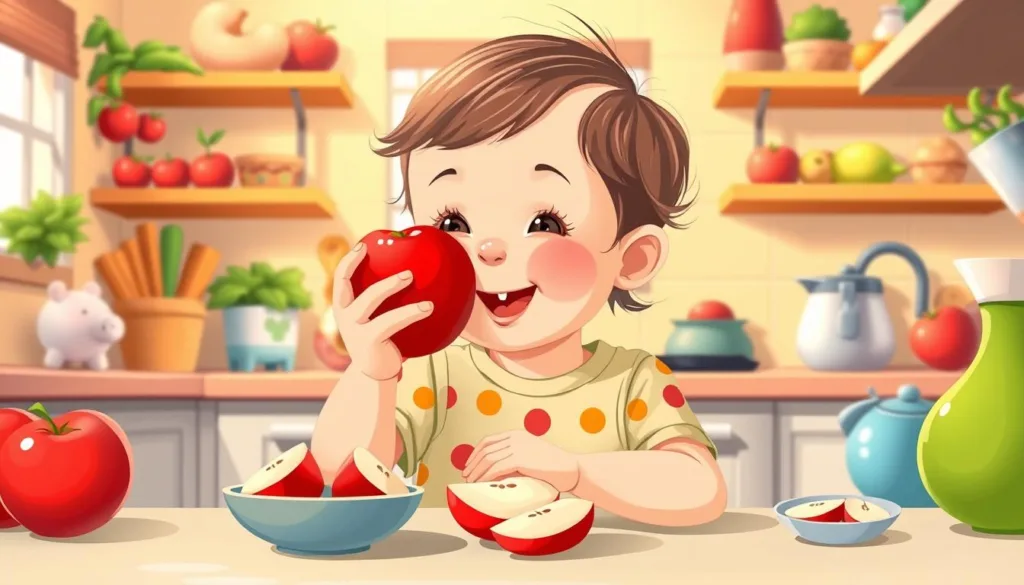
Fiber: The Digestive Health Champion
Apples are full of fiber, with 4-5 grams in a medium apple. They are great for keeping your toddler’s digestive system healthy. The fiber in apples helps in two ways:
- Insoluble fiber moves food through the intestines
- Soluble fiber helps with regular, smooth bowel movements
Pectin’s Powerful Gut Health Benefits
Pectin, a special fiber in apples, supports digestion naturally. Studies in Nutrients show that apples’ prebiotic fibers help good gut bacteria grow.
“Apples can be a delicious way to support your child’s digestive wellness” – Pediatric Nutrition Expert
Managing Digestive Comfort
Adding apples to your toddler’s diet can ease digestive issues. Their high water content and fiber help:
- Prevent constipation
- Keep intestines moving smoothly
- Keep the gut microbiome healthy
| Apple Fiber Benefits | Digestive Health Impact |
|---|---|
| Soluble Fiber (Pectin) | Regulates blood sugar, supports gut bacteria |
| Insoluble Fiber | Adds bulk, promotes regular bowel movements |
| Water Content | Helps prevent dehydration, supports digestion |
Experts say we need 25-35 grams of fiber a day for good digestion. Apples are a tasty, easy way for kids to get this fiber.
Immune System Enhancement Through Apple Consumption
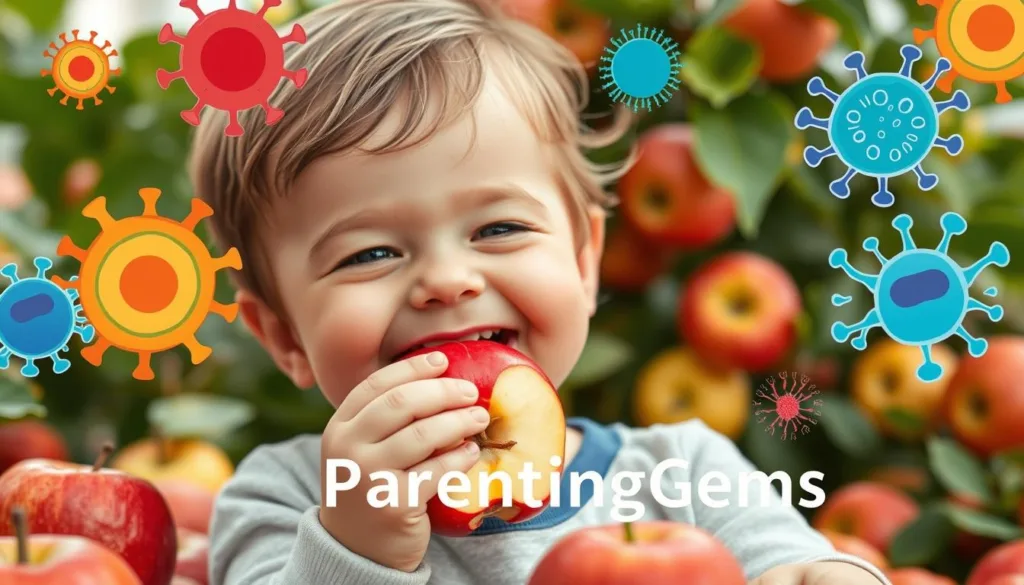
Apples are a great way to help your toddler’s immune system grow strong. They are full of important nutrients. These nutrients give your child a natural boost to fight off sickness.
Apples have a lot of vitamin C, which is key for fighting off infections. Eating one apple gives your child about 14% of the vitamin C they need every day. This helps keep their body healthy and strong.
“Let food be thy medicine,” and apples certainly embody this ancient wisdom for young immune systems.
Apples have many things that help the immune system:
- Powerful antioxidants in apples that combat free radicals
- Soluble fiber supporting beneficial gut bacteria
- Natural compounds that reduce inflammation
Studies show apples are good for the immune system. Eating apples regularly can lower the risk of chronic diseases. It also helps keep the immune system working well.
| Immune-Boosting Nutrients | Benefit to Immune System |
|---|---|
| Vitamin C | Strengthens immune response |
| Flavonoids | Reduces inflammatory responses |
| Antioxidants | Protects against cellular damage |
Interesting fact: Eating two apples a day can lower cancer risk. This shows how amazing apples are for health.
Adding apples to your toddler’s diet is a tasty way to support their immune system. Apples are full of vitamin C, antioxidants, and other nutrients. This makes them a superfood for young kids.
Brain Development and Cognitive Benefits
Apples are more than just a tasty snack for toddlers. They are key in supporting brain growth and cognitive health. The nutrients in apples help your child’s mind grow in amazing ways.
Antioxidants for Neural Protection
The brain is very sensitive to damage. Apples protect it well. Quercetin, found in apple peels, guards brain cells from harm. Studies show these antioxidants can:
- Reduce inflammation in neural tissues
- Protect against cell damage
- Support overall cognitive health
Impact on Memory and Learning
Cognitive growth is vital in early childhood. Apples have special compounds that boost memory and learning. Eating one apple a day can help grow brain cells and improve thinking skills.
Nutrition is key in brain development, with 90% of brain growth happening by age 5.
Supporting Focus and Attention
Apples’ nutrients help improve concentration and mental clarity. Vitamin C and antioxidants support brain function. This is crucial for young children to stay focused.
Adding apples to your toddler’s diet is a natural, tasty way to support brain and cognitive health.
Dental Health and Apple Consumption
Apples are great for your teeth, acting like a natural toothbrush. Their fibrous texture makes your gums healthier and boosts saliva production. This is key for keeping your mouth clean.
When you eat an apple, its crunchy texture cleans your teeth. The fiber in apples helps remove food and plaque. This makes your teeth healthier.
- Fibrous fruits like apples can reduce plaque buildup
- Apples stimulate saliva production, which neutralizes harmful bacteria
- The fruit’s natural texture helps clean teeth surfaces
Apples have many dental benefits:
| Apple Component | Dental Health Benefit |
|---|---|
| Calcium | Strengthens tooth enamel |
| Water content | Promotes saliva production |
| Fiber | Natural teeth cleaning action |
“An apple a day might just keep the dentist more impressed than away!”
For the best oral health, rinse your mouth after eating apples. This removes natural sugars and prevents tooth decay. Brushing your teeth after eating apples also helps protect your teeth.
Note for parents with children wearing braces: Consider cutting apples into smaller, manageable pieces to prevent excessive pressure on dental hardware.
Safe Ways to Serve Apples to Toddlers
Introducing apples to your toddler’s diet needs careful steps and safety focus. Apple preparation for toddlers is more than just cutting and serving. Knowing the right methods can prevent choking and make meals fun and healthy.
Age-Appropriate Preparation Methods
Every age needs its own way to serve apples safely. For younger toddlers (6-9 months), try these:
- Grate apples into fine, soft pieces
- Steam or bake apples until extremely soft
- Puree apples for smooth consistency
Avoiding Choking Hazards
Choking prevention is key when giving apples to young kids. Raw apples are risky for babies and toddlers. The American Academy of Pediatrics suggests certain cutting methods:
- Cut apples into tiny, thin slices (1/4 inch or smaller)
- Remove all seeds and core completely
- Supervise children during eating
Remember: Always watch your child while they’re eating to ensure their safety.
Creative Serving Suggestions
Make eating apples fun and safe with these ideas:
- Apple chips baked until crisp
- Grated apples mixed into yogurt
- Soft, cinnamon-baked apple pieces
- Apple puree as a smooth dip
By following these tips, you can safely add apples to your toddler’s diet. This ensures their safety and nutrition.
Best Apple Varieties for Toddlers
Choosing the right apple for kids is key for their health and fun. With over 2,500 apple types around the world, picking the best sweet apples for your toddler is a fun journey.
Looking for apples that are easy for kids to eat? Here are some top picks:
- Gala Apples: Exceptionally sweet and soft, ideal for young palates
- Fuji Apples: Crisp texture with a delightful sugary flavor
- Red Delicious: Mild sweetness and gentle bite perfect for toddlers
- Honeycrisp: Balanced sweet-tart taste with juicy crunch
Think about these things when picking apples for your little ones:
- Softness of flesh
- Sugar content
- Ease of chewing
- Flavor profile
“The right apple can transform a picky eater into a fruit-loving child” – Pediatric Nutrition Expert
For cooking and baking, Granny Smith or Braeburn apples are great. Always wash apples well and cut them into sizes that are safe for toddlers to avoid choking.
Incorporating Apples into Daily Meals
Adding apple recipes for kids to your toddler’s diet can be fun and healthy. Apples are a versatile ingredient that makes snacks exciting and tasty for young children.
It’s easy to add apples to your child’s meals. These fruits are packed with nutrients and can become a regular part of their diet.
Breakfast Apple Delights
- Sprinkle chopped JAZZ apples over morning oatmeal
- Create apple cinnamon smoothies
- Prepare mini apple pancakes
- Mix diced apples into yogurt
Healthy Apple Snack Options
Apple meals can be both creative and nutritious. Here are some quick and easy options:
- Apple slices with almond butter
- Baked apple chips
- Apple and cheese roll-ups
- Mini apple muffins
Toddler-Friendly Apple Recipes
| Recipe | Preparation Time | Nutritional Benefit |
|---|---|---|
| Apple Cinnamon Oatmeal | 10 minutes | Fiber, Vitamin C |
| Apple Squash Soup | 25 minutes | Antioxidants, Vitamin A |
| Apple Peanut Butter Sandwich | 5 minutes | Protein, Healthy Fats |
“Apples are a portable and delicious ingredient suitable for healthy breakfasts, snacks, and lunch boxes” – Nutrition Expert
The secret to successful apple recipes for kids is creativity and presentation. Make healthy apple snacks look good and fun. This will encourage your toddler to enjoy nutritious eating.
Potential Concerns and Precautions
Apples are very good for you, but parents need to watch out for some safety issues when giving them to toddlers. It’s important to know about risks that could affect your child’s health.
About 2% of people in Western countries have apple allergies. It’s key for parents to spot allergic reactions early. Symptoms can be mild or serious, especially in kids with food sensitivities.
- Watch for signs of apple allergies such as:
- Skin rashes
- Mild swelling
- Digestive discomfort
Pesticide residue is another big worry for parents. Organic apples are recommended to minimize exposure to harmful chemicals. Here’s how to pick the right apples:
- Choose organic varieties whenever possible
- Thoroughly wash apples under running water
- Peel the skin for younger children
“Prevention is always better than cure when it comes to your child’s nutrition.” – Pediatric Nutrition Expert
Choking hazards are a big deal with apples. Always cut apples into small pieces for your toddler. Make sure to watch them while they eat to keep them safe.
Also, keep an eye on sugar content. Apples have natural sugars, but too much can add extra calories. Try to keep apple servings in check and mix them with other healthy foods.
Conclusion
Getting your toddler to eat right can be tough, but apples are a great help. They are full of health benefits that help your child grow. As a top pick for kids, apples add important nutrients to their diet.
Apples are packed with fiber, vitamins, and antioxidants. They help with digestion, boost the immune system, and support brain growth. They also have nutrients like quercetin and vitamin C that are good for bones and muscles.
When adding apples to your toddler’s meals, pick organic ones and wash them well. Cut them into safe sizes and try different ways to serve them. This way, you make mealtime fun and healthy for your child.
In short, apples are more than a snack. They are a key part of a healthy diet for your toddler. They help your child stay healthy with every bite.
FAQ
Are apples safe for toddlers to eat?
Yes, apples are safe for toddlers when cut right. Make sure they’re small to avoid choking. Always watch your child while they eat. For the youngest, try grating or cooking apples to make them softer. Avoid giving whole apples or big chunks.
What are the main nutritional benefits of apples for toddlers?
Apples are full of good stuff like vitamin C, fiber, and antioxidants. A medium apple has less than 100 calories. They also have calcium, magnesium, and potassium. Apples are good for the heart, boost immunity, help with digestion, and might control blood sugar.
How can I serve apples to my toddler?
There are many fun ways to give apples to toddlers. Try apple slices with peanut butter, grated apples in oatmeal, or baked apple chips. You can also blend them into smoothies. Apple and peanut butter sandwiches, individual baked apples, or adding chopped apples to yogurt or cereal are great too.
Which apple varieties are best for toddlers?
Gala, Fuji, and Red Delicious apples are great for toddlers. They taste sweet and are soft. Honeycrisp apples have a nice balance of sweet and tart. Choose apples that are easy to chew and have a mild taste.
Can apples help with my toddler’s digestive health?
Yes, they can! Apples have both soluble and insoluble fiber, which is good for digestion. The pectin in apples helps with diarrhea and keeps bowel movements regular. It also helps clean the intestines and move food smoothly.
Are there any risks associated with giving apples to toddlers?
While apples are mostly safe, there are some risks. They can be a choking hazard if not cut right. They might have pesticide residues, and too much can lead to high sugar intake. Some kids might get upset stomachs from the fiber. Always wash apples well and introduce them slowly.
Can apples support my toddler’s brain development?
Yes, they can. Apples have compounds that might help the brain. These antioxidants can improve memory and learning. They might also protect brain cells from damage. More research is needed to fully understand their brain benefits.
Do apples help with dental health?
Apples can help clean teeth by making gums healthier and increasing saliva. This helps fight bacteria. But, the sugars in apples can cause cavities if not brushed away. So, brush teeth after eating apples.

